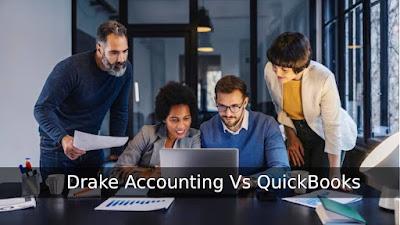Are you searching for the perfect accounting software for your business? Look no further! In this comprehensive comparison, we will dive into the world of Drake Accounting and QuickBooks. These two powerhouse solutions have long been hailed as leaders in the industry, but which one is truly right for your business needs? Join us as we explore the features, advantages, and disadvantages of both options. By the end of this article, you'll have a clear understanding of whether Drake Accounting or QuickBooks is the ideal choice to help streamline your financial management processes. So let's get started on this exciting accounting software showdown!

Comparing Drake Accounting vs QuickBooks
When it comes to comparing Drake Accounting vs QuickBooks, there are several key factors to consider. Both software options offer a range of features designed to streamline your accounting processes, but they do differ in certain aspects.
Drake Accounting is known for its robust tax preparation capabilities. It provides comprehensive tools and resources specifically tailored for tax professionals. With Drake Accounting, you can efficiently handle individual and business tax returns, easily import data from various sources, and generate accurate calculations.
On the other hand, QuickBooks is widely recognized as an all-around accounting solution suitable for businesses of all sizes. Its user-friendly interface makes it accessible even for those without extensive accounting knowledge. QuickBooks offers a variety of features including invoicing, expense tracking, inventory management, and financial reporting.
In terms of pricing models, both platforms offer different plans depending on the specific needs of your business. Drake Accounting operates on a per-user basis with additional fees for modules such as payroll or document manager. QuickBooks has subscription-based plans that vary based on the level of functionality required.
When choosing between Drake Accounting and QuickBooks it's crucial to assess the unique requirements of your business operations along with considering factors like cost-effectiveness and ease-of-use.
Overview Drake Accounting
Drake Accounting is a popular accounting software that offers a comprehensive range of features and tools to help businesses manage their finances effectively. It is designed with small and medium-sized businesses in mind, making it accessible for individuals who may not have extensive accounting knowledge.
One of the key advantages of Drake Accounting is its user-friendly interface, which makes navigation and data entry intuitive and straightforward. The software also offers a wide variety of customizable templates and reports, allowing users to generate financial statements tailored to their specific needs.
Additionally, Drake Accounting provides robust security measures to protect sensitive financial data. With features such as password protection and secure backups, users can rest assured knowing their information is safe.
Furthermore, Drake Accounting integrates seamlessly with other business applications, enabling smooth data transfer between different systems. This integration capability streamlines processes and eliminates the need for manual data entry across multiple platforms.
Drake Accounting stands out for its user-friendly interface, customization options, strong security measures, and seamless integration capabilities. It has become a trusted choice for many businesses looking for an efficient accounting solution that meets their unique requirements.
Overview QuickBooks
QuickBooks is a popular accounting software that has been around for over three decades. It was developed by Intuit and is specifically designed for small and medium-sized businesses. With its user-friendly interface and robust features, QuickBooks has become the go-to choice for many companies.
One of the key advantages of QuickBooks is its flexibility. It offers both cloud-based and desktop versions, allowing users to access their financial data from anywhere at any time. This makes it ideal for businesses with remote teams or multiple locations.
In terms of functionality, QuickBooks covers all the essential accounting tasks such as invoicing, expense tracking, bank reconciliation, and payroll management. It also integrates with other business tools like CRM systems and e-commerce platforms to streamline operations.
Another notable feature of QuickBooks is its strong reporting capabilities. Users can generate various financial reports like profit/loss statements, balance sheets, cash flow statements, and more. These reports provide valuable insights into the company's financial health and help in making informed business decisions.
QuickBooks provides a comprehensive solution for managing finances efficiently. Its intuitive interface combined with powerful features makes it an excellent choice for small businesses looking to automate their accounting processes effectively.
Pros and Cons Drake Accounting vs QuickBooks
Drake Accounting and QuickBooks are two popular accounting software options for businesses. Each has its own unique set of pros and cons that can help you decide which one is right for your business.
One of the benefits of Drake Accounting is its affordability. It offers a lower price point compared to QuickBooks, making it a more budget-friendly option, especially for small businesses or startups with limited funds.
Another advantage of Drake Accounting is its robust tax preparation features. It is specifically designed for tax professionals and includes all the necessary tools and forms needed to prepare accurate tax returns efficiently. This can be a significant time-saver for accountants who specialize in tax services.
On the other hand, QuickBooks offers a user-friendly interface that makes it easy for non-accounting professionals to navigate and use effectively. Its intuitive design allows users to quickly learn how to input data, generate reports, and manage their finances without extensive accounting knowledge.
QuickBooks also provides an extensive network of integrations with third-party applications such as payment processors, inventory management systems, and CRM software. This flexibility allows businesses to streamline their operations by syncing data across multiple platforms seamlessly.
However, one potential drawback of QuickBooks is its pricing structure. While it does offer different plans tailored to various business sizes and needs, some users may find the cost higher compared to other accounting software options on the market.
Both Drake Accounting vs QuickBooks have their strengths: Drake Accounting excels in tax preparation features while offering affordability; meanwhile, QuickBooks boasts user-friendliness and extensive integration capabilities but comes at a potentially higher cost. Considering your specific business requirements will help determine which software best fits your needs.
Which Is Better For Your Business?
Which accounting software is better for your business: Drake Accounting or QuickBooks? Let's take a closer look at both options and weigh the pros and cons.
Drake Accounting offers robust features that cater specifically to tax professionals. With its comprehensive tax planning tools, integration with e-filing services, and customizable tax forms, it is a popular choice for accountants who specialize in taxes. Additionally, Drake Accounting provides excellent customer support and training resources to help users navigate their platform effectively.
On the other hand, QuickBooks is a versatile accounting software that caters to businesses of all sizes across various industries. Its user-friendly interface makes it easy for non-accounting professionals to manage their finances efficiently. QuickBooks also offers powerful invoicing capabilities, inventory tracking, expense management, payroll processing, and seamless integration with third-party applications.
When determining which software is better for your business, consider your specific needs and requirements. If you primarily focus on tax-related tasks or work as a tax professional, Drake Accounting may be the ideal choice. However, if you need an all-in-one solution that covers a wide range of financial aspects for your business operations regardless of industry type or size - QuickBooks might be more suitable.
Ultimately though the decision depends on factors such as budget constraints; technical skills within your team; scalability requirements; level of customization needed; reporting needs etc., It's important to thoroughly evaluate both options before making a final decision – ensuring it aligns with your unique business goals and objectives!
Remember that each business has different needs when it comes to accounting software solutions! So take the time to carefully assess what matters most based on YOUR circumstances!
Conclusion
After analyzing the features, strengths, and weaknesses of both Drake Accounting and QuickBooks, it is clear that both software options offer robust accounting solutions for businesses. However, choosing between them ultimately depends on your specific needs and preferences.
If you are a small to medium-sized business with simple accounting requirements, QuickBooks may be the ideal choice for you. It offers user-friendly interface, extensive integrations with other tools, and excellent customer support. Its affordability also makes it a popular option among startups and freelancers.
On the other hand, if you have more complex financial processes or work in industries such as tax preparation or CPA firms, Drake Accounting might be better suited for your needs. With its comprehensive tax features like e-filing capabilities and advanced reporting functionalities specifically designed for accountants, it can streamline your workflow and enhance efficiency.
To make an informed decision between Drake Accounting vs QuickBooks for your business's accounting needs, consider factors such as the size of your organization, industry-specific requirements, budget constraints, scalability potential, and desired level of customization.
Remember to take advantage of free trials or demos offered by both software providers to get hands-on experience with their functionalities before making a final decision.
Ultimately, it is essential to evaluate how each software aligns with your unique business goals to make an informed decision that will set you up for long-term success in managing your finances effectively!

